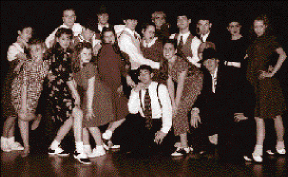By Susanne Frost Olsen, ‘75, Alan C. Taylor, ‘93, and Kelly DiSpirito Taylor, ‘92
The parent-child relationship is both sacred and infinitely necessary. However, every individual in a family should be involved in supporting parents–especially when a parent is rearing children alone. Grandparents and other extended family members can be influential in supporting and strengthening parents.
Historically, the functioning family unit included more than just the traditional nuclear family. Elder J. Richard Clarke, a member of the First Quorum of the Seventy of the Church of Jesus Christ, comments, “In earliest biblical culture, the family was more than a parent and child unit. It included all who were related by blood and marriage. This kindred family, as I prefer to call it, was strongly linked by natural affection and the patriarchal priesthood. The elderly were venerated for their experience and wisdom. There were strength and safety in numbers, and, through love and support, members established solidarity and continuity.”
Grandparental Influence
Grandparents have been found to be influential in some of the fundamental aspects of their grandchildren’s lives, namely in helping them form their identities and in transmitting values, ideals, and beliefs to them. These areas have been described in family research over several decades.
Grandparents have a strong impact on their grandchildren’s sense of identity. When an individual does not have intergenerational family relationships, he or she may lack a cultural and historical sense of self. A lack of bonds, especially at the intergenerational level, may yield a less-developed sense of identity. Through relationships with those of previous generations, we can gain a better grasp of who we are and where we came from. One scholar theorized that the particular human chain we belong to is central to our individual identity. In addition, research with adolescents and young adults shows that transmitting knowledge about cultural and familial roots may be the most important way grandparents can influence an adolescent’s search for identity.
Grandparents are also important in the transmission of values, ideals, and beliefs to grandchildren. Certain traits are more commonly transmitted intergenerationally than are others. These may include religious affiliation, education, and occupational achievement. Sexual, moral, and educational beliefs have also been associated with grandparental influence. Some research shows that grandmothers play an especially important role in their grandchildren’s value development. Work ethics, however, seem to be equally influenced by both grandmothers and grandfathers.
Roles Grandparents Play
Grandparents can influence their grandchildren through the roles they assume in their grandchildren’s lives. Based on interviews of 300 grandchildren, Kornhaber and Woodward suggested a number of direct roles played by grandparents,· including the following:
Family historian. Grandparents who act as family historians inform current generations about the experiences of their progenitors and the origins of their family lineage. Grandparents often remember more about family history and are able to provide continuity in family traditions. This is a particularly important role, given the strong emphasis of the Church of Jesus Christ on genealogy and the knowledge that families have the opportunity to be united beyond this life into the eternities. Of grandparents, Improvement Era editor Bill R. Linder wrote: “They serve as a link between the child and the preceding generation, bringing continuity to the family and knowledge of previous eras. . . . Through grandparent companionship, the child learns the humanness and early experiences of his parents. The child has something on which to build his own personality and attitudes–different and separate, yet part of his family units. . . . Without the past there is no future–and if we close the connecting links we will not only find the past, but we will be prepared for the future also.”
Mentor-teacher. As mentors and teachers grandparents take time to teach a moral principle or skill or instruct in some meaningful way. For example, former Church President Ezra Taft Benson encouraged grandparents to take time to read with their grandchildren and to tell them stories. Through this type of interaction, “children then obtain a perspective of life which is not only rewarding but can bring them security, peace, and strength.” In addition grandchildren may emulate grandparents’ examples observed through one-on-one interactions. Mentorship can also involve assuming patriarchal and matriarchal responsibilities within the extended family unit. President Benson emphasized this idea when he stated, “We urge all senior members, when possible, to call their families together. Organize them into cohesive units. Give leadership to family gatherings. Establish family reunions where fellowship and family heritage can be felt and learned.”
Nurturer. Another role that provides important opportunities for grandparents is that of being nurturers of grandchildren’s emotional and physical well-being. Almost all grandparents will at least occasionally assume a nurturing role in the lives of their grandchildren. Many grandparents feel a need to assure themselves of the physical and emotional well-being of their posterity, which makes this role a vital one in many families.
Role model. With the state of today’s deteriorating society, grandchildren are often in need of positive role models in their lives. Adolescents and young adults are continually searching for people to emulate. Of this Elder Monte J. Brough of the First Quorum of the Seventy commented, “Most of us, with relatively little effort . . . can provide for our families a veritable list of important role models. This list can be created from a modest search into the lives of our ancestors.” Grandparents can serve this function for families and society simply by living honorable and respectable lives. They can be the heroes grandchildren seek to pattern their lives after. Most grandchildren are observant and will strive to emulate specific qualities they find admirable in the adults with whom they associate–especially their parents and grandparents. In a study of Latter-day Saint grandfathers and their adult grandchildren, many of the grandchildren interviewed respected and acknowledged their grandfathers as the patriarchs of their families, and consequently, many said they wanted to emulate their grandfathers in this role.
Playmate. Finally, grandparents can serve as playmates in the lives of their grandchildren. Sometimes parents are busy with jobs and the responsibilities of other children; however, grandparents are free from some of these obligations. For example, in one study recreational activities were a dominant theme discussed by adult grandchildren as a source of bonding with their grandfathers.
Strengthening Intergenerational Ties
Most people acknowledge that strengthening relationships between grandparents and grandchildren is important to family well-being, but many wonder how best to build these intergenerational ties. In the study of grandfathers and their adult grandchildren, several categories of activities were identified as effective in strengthening intergenerational bonds. Such activities included family get-togethers, working and doing chores, recreational activities, phone calls and conversations, and family- and church-oriented activities.
Regarding parenting, the proclamation on the family states, “Disability, death, or other circumstances may necessitate individual adaptation. Extended families should lend support when needed.” Grandparents can provide such support to parents in myriad ways while building enduring and edifying relationships with their grandchildren.
Susanne Frost Olsen is an associate professor of marriage, family, and human development at BYU. Alan C. Taylor is an assistant professor of child and family studies at Syracuse University. Kelly DiSpirito Taylor has a master’s degree in family science and is a full-time homemaker.









